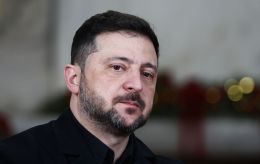OSCE Troika condemns Russia’s violation of principles of Helsinki Act
 Photo: OSCE Troika condemns Russia’s violation of Helsinki Act principles (flickr.com)
Photo: OSCE Troika condemns Russia’s violation of Helsinki Act principles (flickr.com)
The OSCE Troika, on the 50th anniversary of the Helsinki Final Act, condemned Russia's aggression against Ukraine, calling it a "grave and unprecedented violation" of the principles of this document, according to a statement from the Troika, which includes the current, former, and incoming OSCE Chairmanships.
"Yet, on this anniversary, we must acknowledge a painful truth: these principles have been repeatedly challenged and violated over the past 50 years. Today, the Russian Federation’s ongoing war of aggression against Ukraine constitutes a grave and unprecedented violation of the very principles the Helsinki Final Act was intended to uphold," the statement reads.
The OSCE Troika emphasized that this unprovoked and unjustified war has caused immense human suffering and "caused profound damage to the European security order."
According to the statement, this is "not only an attack on Ukraine, but an assault on the shared commitments of all OSCE participating States."
"On this august anniversary, the OSCE Troika holds true to the Helsinki Final Act in condemning Russia’s aggression in the strongest possible terms and reaffirms its unwavering support for Ukraine’s sovereignty, independence, and territorial integrity within its internationally recognized borders. Violations of the Helsinki principles cannot be allowed to stand unchallenged," the statement concludes.
In 2025, the OSCE Troika consists of Finnish Foreign Minister Elina Valtonen, Maltese Deputy Prime Minister and Minister for Foreign and European Affairs and Trade Ian Borg, and Swiss Federal Councillor and Head of the Federal Department of Foreign Affairs Ignazio Cassis.
Helsinki Final Act
The Helsinki Final Act was signed on August 1, 1975, in the capital of Finland by representatives of 35 countries, including all European states (except Albania), as well as the United States, Canada, and the Soviet Union.
It is a key international document from the period of détente during the Cold War, which laid the foundation for the creation of the Organization for Security and Co-operation in Europe (OSCE).
The Act outlined principles meant to govern relations between states: respect for sovereignty, non-intervention in internal affairs, inviolability of borders, peaceful settlement of disputes, respect for human rights and fundamental freedoms, and the right of peoples to self-determination.
The document consisted of three main areas: security in Europe, economic and scientific-technical cooperation, and humanitarian issues, including human rights, freedom of speech, and freedom of movement.
Although the Act did not have legally binding force, it became an important political commitment for participating states.
For Ukraine, which at the time of signing was part of the Soviet Union, the Helsinki Final Act later became a foundation for defending its sovereignty after gaining independence. The country now bases its international arguments against Russian aggression on the principles enshrined in the Act.
Ukrainian Deputy Foreign Minister Andrii Sybiha stated that Russia’s overnight strikes on Ukraine on July 31 are the way Russian President Vladimir Putin chose to "celebrate" the 50th anniversary of the Helsinki Final Act.

